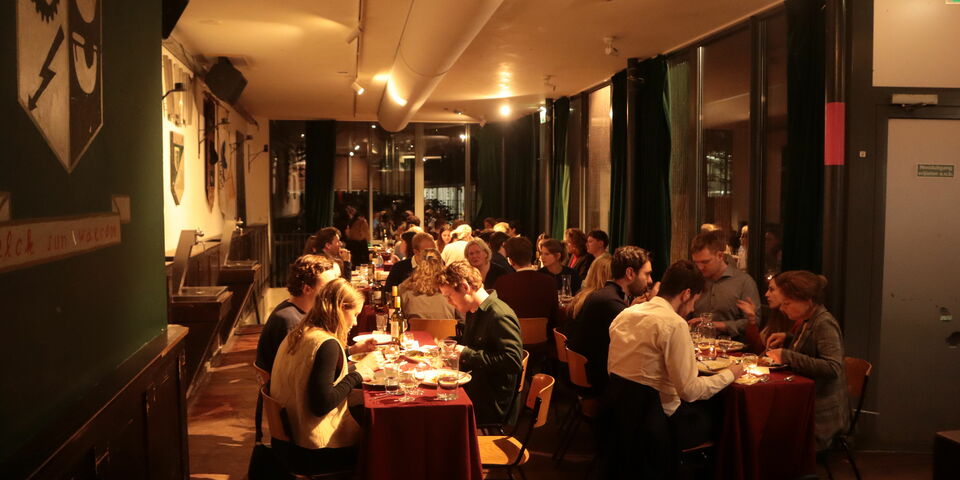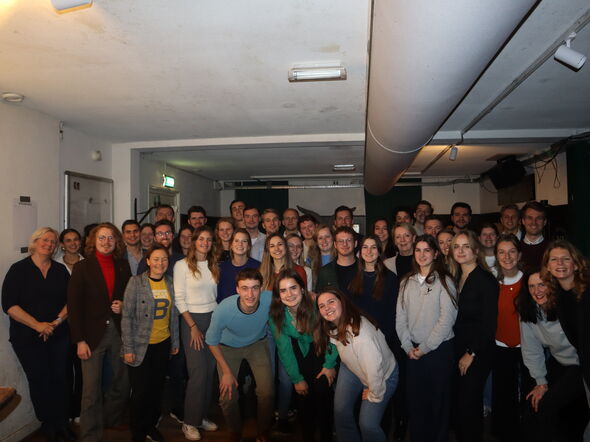Housing and study penalty main topics at municipality dinner
Questions flew back and forth during the fourth edition of the municipality dinner. Students talked to municipal council members while enjoying a three-course meal. Topics ranged from interest (or lack of interest) in local politics to the student housing shortage and slow-progress penalty.
Around fifty students and municipal council members had gathered at the headquarters of student association Eindhovense Studenten Corps (E.S.C). The dinner is an initiative by student group DAS. The three courses, completely vegan and nut-free, were prepared by the E.S.C. cooking committee and sponsored by Stehven.
In total, seven parties were represented by the council members present, many of whom were there for the fourth time. People started mingling as soon as they entered. Ties were rekindled and new contacts were made.
Local politics
After everyone had found their name card on the eight tables in the room, the conversations started almost immediately. There were blue cards with starter questions on the table, but they were only picked up out of curiosity and almost immediately put down again. The conversations that were actually going on were more interesting.
Local GroenLinks party leader Eva de Bruijn was sitting at a table with four students. Over the appetizer, cucumber in soy sauce with sesame seeds, De Bruijn asked them about the most important problems students are facing right now. The housing shortage, slow-progress penalty, and high workload were mentioned.
When the conversation shifted to local politics, students indicated that they do indeed get a sense of what’s happening in the House of Representatives, but that the municipality sometimes still feels like something far removed from their daily lives. De Bruijn then pointed out that the most important topics they had mentioned aren’t only relevant to Eindhoven and the region, but also noticeable closer to home, on the campus. Examples include the high workload, the shortage of psychologists, and internationalization.
Housing shortage
The conversation at the table kept coming back to an important topic: the housing shortage. It remains incredibly difficult to find suitable housing in the city. The students indicated that new housing is increasingly focused on the needs of international students rather than those of Dutch students. Many studios are being built, but Dutch students prefer to live in a student home. They’ve also noticed that student homes are increasingly being put up for sale.
Anne Karien van der Stee obtained a bachelor’s degree at TU/e and is currently enrolled in a master’s program at Tilburg University. She has attended every edition so far. After the appetizer, she listed the benefits of events like this. “It’s especially nice for the council members, who learn more about what is going on with the students. In addition, they make new contacts at the associations, which often change of course. And it helps students to become more politically involved again.”
Slow-progress penalty
Even before everyone was done talking, they had to switch tables. After a brief introduction, the topic almost immediately turned to the slow-progress penalty. Students see that although this hasn’t been implemented yet, it does cause reluctance among fellow students to do something extra in addition to their studies.
After the main course, sliced noodles with carrots, had been served, the penalty remained the topic of conversation. Main talking point was the lack of clarity about certain exceptions to the penalty. These will have a negative effect on student culture, the table feared. Because why would a student commit another year to something if it ends up costing them three thousand euros?
Informal
After dessert, chia seeds with raspberries, a number of council members left for a meeting, but some stayed for drinks. Student Thirsa Kho (Industrial Engineering & Innovation Sciences) of E.S.C. also stayed to chat for a while longer. She indicated that she had enjoyed hearing how the council members view certain problems and which problems they themselves consider important. “I found it a very useful evening, and nice and informal. You really talk to each other. Not just about the typical topics, such as the slow-progress penalty. I also learned things about mobility and sustainability in the city.”
The conversation in the coatroom was mainly about the temperature in the dining room, which had been a bit on the low side, depending on where you were sitting. “What header will you choose for your article?” someone asked this reporter. “Sky-high energy costs also noticeable at municipality dinner?”



Discussion